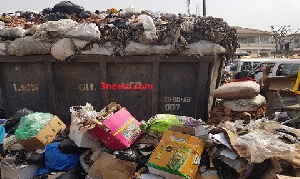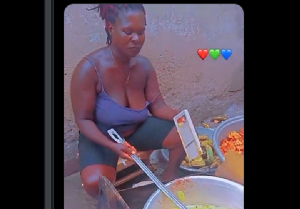Ghana is in dire straits when it comes to sanitation. One out of every five Ghanaians defecates in the open and about 90% of all our excreta end up in streams and rivers – the same place our drinking water comes from. If Accra, the national capital, had to dump human excreta into the sea for several years, then one can only imagine what happens in other towns and cities across the country. Solid waste management, on the other hand, is nothing to write home about although private sector involvement has caused some improvement. Our streets and gutters are still littered with waste and unpleasant sights of pest-infested, stinking and overflowing waste collection containers are not uncommon in our market centres and suburbs.
The result is the annual outbreak of Cholera and other preventable diseases in the country. Sadly enough, sanitation-related diseases have over the years been among the top ten diseases reported at Out-Patients Departments (OPDs) in health centres costing the nation huge sums of money annually. Estimates show that, Ghana loses close to US$300million every year due to poor sanitation - money that can be used to construct a grade 35 concrete road from Takoradi to Paga (about 900km). Yet, poor sanitation remains an unseen emergency to the public and decision makers because its effects is not as sudden as an earthquake or tsunami which claims thousands of lives within a short period.
In an article published on September 8, 2014, I called for the creation of the Ministry of Water, Sanitation and Environment in Ghana. Fortunately, the government of the day, realizing the urgent need to focus more on water and sanitation, has created one solely for sanitation and water resources. Indeed, this is a step in the right direction if sanitation issues can be adequately addressed. But let’s not rest on our oars – a huge task lies ahead. The new Ministry must, as a matter of urgency, develop and implement innovative solutions that would put us on a sustainable path to disentangling the country from the current sanitation crisis we find ourselves in. Being a citizen but not a spectator, I would like to suggest the following key transformative shifts needed to address the seemingly insurmountable sanitation problems confronting our dear nation.
First and foremost, we need to find innovative funding models to sanitation. In the 2017 budget, 255 million Ghana cedis (almost US$60 million) was allocated to the new Ministry. Regrettably, out of this amount, 85% is expected to be provided by donors – the same old story. We cannot remain on this unsustainable path repeating the wrongs of the past but expecting different results. This is exactly what has left us where we are now. To gauge what lies ahead, over the next 10 years, Ghana needs about US$3billion to come out of its sanitation misery.
This means that even if all the annual funding for the Ministry of Sanitation and Water Resources should be provided by donors in the next ten years, we will still be short of the funding needed to address sanitation. Undoubtedly, donor funding can never take us to the ‘promised land’. As the country seeks to move into the upper middle-income status, we must devise innovative strategies to sustainably decouple ourselves from aid. Sustainable development does not rely on donor largesse. It will take a lot more than donations to achieve and maintain adequate sanitation for every Ghanaian by the year 2030 as the Sustainable Development Goal (SDG) 6.2 requires.
Going forward, this is time to make the sanitation sector an attractive sector for businesses to thrive. Because, it is only by doing so that private investments can be attracted into the sector to gradually set us free from handouts from donors and move the country towards sustainable development. No developed country in the world, of course except India, has been able to develop without improving access to safe sanitation. This is because, it has been shown empirically that addressing sanitation issues in a country generates positive ripple effects on the national economy, health, education and several other sectors. It was not for nothing that Mahatma Gandhi once said: “Sanitation is more important than political independence”.
We must vigorously pursue an agenda that seeks to promote establishment of businesses that create value from waste. In Europe, the Netherlands imports waste from Germany and the UK while Sweden sends less than 1% of its solid waste to the landfill site (disposal) and turns 99% of the waste into useful resources. In Kenya, some public toilets are retrofitted to generate biogas from human excreta that can produce electricity. Meanwhile, in Accra and many parts of our country, we cannot even find a place to dump solid waste because we see it as a useless resource instead of a source of revenue and employment especially for our teeming youth.
A couple of private companies including Safi Sana and ZoomLion are pioneering such initiatives but these are grossly inadequate if we are serious in addressing our sanitation challenges in the long term. What prevents us from promoting the establishment of companies that recycle organic waste, metals, papers, plastics into useful products and turn human excreta into biochar, compost and biogas? In fact, we have no excuse. We cannot have the physical space to continually dump our waste. Instead of the government constructing disposal sites, the funds must be channeled into waste-to-resource facilities that turn waste into useful products to sustainably address the sanitation challenges.
In terms of improving access to safe household toilets, a multi-pronged approach needs to be adopted. The World Bank in 2013 launched a $150 million Greater Accra Metropolitan Area (GAMA) sanitation and water project to, among others, provide 12,500 toilets by 2018 in low income communities in GAMA. However, as of May, 2017 only 900 toilets (7%) have been constructed. Really?! The average cost of one toilet provided to these low-income households was Gh¢4,000 (about US$1,000) and the households were expected to pay half of the cost for the project to pay the remaining half.
As if that were not enough, another project funded by the Water and Sanitation for the Urban Poor (WSUP) UK is also suffering the same fate. The project is expected to provide 9,500 toilets to residents in low-income communities in the Kumasi Metropolis and the Ga West Municipality by 2019. However, as of September, 2016, only 126 toilets (1%) have been constructed.
Where lies our conscience as a nation? Are we serious about addressing sanitation? We need to vigorously pursue the agenda of ensuring that every household has access to a toilet and disabuse people’s mind of depending on filthy public toilets and defecating in the open. Adoption of low cost toilet technologies that can equally provide the needed service to significantly reduce the cost for many people in the low-income bracket is very crucial.
The sludge from these low-cost technologies can be a resource for downstream businesses to be converted into useful products. This will put premium on the resulting waste from the toilet technologies. Authorities must also realize that, the lack of toilets in our country is not only because people do not have money but because household toilets are mostly at the bottom of people’s priority list. Therefore, as we seek to support households acquire low-cost toilets let us also crack the whip by enforcing sanitation bye-laws.
Environmental Health Officers need to be well-resourced and incentivized to do so. Environmental Health and Sanitation Departments should be adequately resourced in terms of human resource, logistics and funds and given annual targets for household toilet construction. Those that are able to achieve these annual targets must be rewarded to ensure that innovative strategies can be adopted to improve sanitation. The Ghana Sanitation Challenge is trying to implement a similar initiative but unfortunately it is limited to few Municipalities and Districts and it is over a short period.
We need a systemic, farsighted and sustainable change to addressing sanitation menace we find ourselves in currently. This is therefore the time to take our destiny into our own hands and adopt out-of-the-box strategies fueled by domestic funds to transform the sanitation sector.
We cannot solve our problems with the same thinking we used when we created them.
– Albert Einstein
Opinions of Saturday, 19 August 2017
Columnist: Isaac Monney







![A file photo of the private jet [Image Credit: Yaw Pare via Facebook] A file photo of the private jet [Image Credit: Yaw Pare via Facebook]](https://cdn.ghanaweb.com/imagelib/pics/153/15348139.295.jpg)







